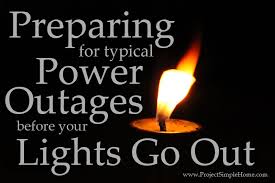 The lights go out. What do you do? Let’s assume you’ve already sat there for a few moments, possibly in the dark, and they haven’t come back on yet. Do you know what you need to do in a power outage? Do you know what you need to get? Do you know where everything is located? And, the biggest question, does everyone else in your family also know your plan?
The lights go out. What do you do? Let’s assume you’ve already sat there for a few moments, possibly in the dark, and they haven’t come back on yet. Do you know what you need to do in a power outage? Do you know what you need to get? Do you know where everything is located? And, the biggest question, does everyone else in your family also know your plan?
This is our plan, specific to our home. I’m providing it as an example of the items you may want to cover in your own plan. (It’s easy to procrastinate, I’m just now writing down our plan after we’ve been living in this house for over two years.)
LIGHTS OUT CHECKLIST
Is the power really out?
- Check the fuse box to be sure everything is turned on correctly, and none of the breakers are tripped.
- Look around the neighborhood, is everyone’s power out?
Light
- Get a flashlight and/or headlamp, located near the door in the mudroom.
- Turn on the battery bank‘s inverter, if necessary reset the inverter (the manual is hanging on the side of the bar refrigerator).
- If the battery bank doesn’t work, use the 800 amp inverter with the truck’s battery(s)(it’s located in the truck box) — connect it directly to the battery, and run extension cord into house.
- Unroll the extension cord that’s already attached to the battery bank, it’s located on the wall beside the utility sink in the laundry room. This will be your central power outlet(s).
- Get the lamp out of Sarah’s office, and the other lamp from the rec room, and put them in central locations.
- Get the battery-powered lanterns out, located in the black box under the pool table, and put the batteries in them (stored with the lanterns). Put the small red one in the bathroom, keep the larger two available for use where needed.
- Use caution when choosing to use fire for light. If candles or kerosene lanterns are used, place the fire extinguisher nearby. Long burning candles are in the cupboard in the workshop, kerosene lanterns are on the shelf in the bar.
Heat
- Unplug the furnace from the wall and plug it into the battery bank extension cord (this will power the blower, the furnace runs on propane).
- If the battery bank is depleted, the furnace can be plugged directly into the generator.
- Get the Buddy Heater (and it’s batteries), and a small propane tank, from the barn. Put the batteries into the Buddy Heater (for the blower). Attach heater to tank and turn it on, once running turn on blower (follow directions).
Food
- The microwave, plugged into the battery bank, can be used for short periods of time to heat food. The microwave can also be plugged into the generator as needed.
- Propane grill, on the patio.
- Propane stove, in the barn.
- The Volcano Stove can be used with propane, or charcoal (outside, or in the garage/barn with door open).
Water
- Remember once the power goes out the well no longer pumps, there is less than 25 gallons of water in the pressure tank.
- Bring in the 5-gallon yellow Igloo jug from the barn, also bring in a 5-gallon water jug. Put the Igloo on the kitchen table and use for drinking and cooking.
- Only flush when “needed”; refill toilet tank with 3 gallons of water from the rain barrels or the pond.
- Use hand wipes/disinfecting wipes for cleaning as needed.
- The well pump can be plugged directly into the generator; the plug is near the pressure tank (use 220 volt cord).
- Board games.
- The battery bank can run the TV and the DVD player.
- Reading.
- Electronic devices can be charged with the battery bank.
Other things to remember
- Open the refrigerator and/or freezer as little as possible.
- Keep outside doors closed to maintain heat.
- There is additional drinking water in 2-liter bottles on the top garage shelf.
- Keep cell phones charged.
- The landline phone will work, but only the one in Sarah’s office.
Again, this is our list. We’ll test it next weekend when the girls are here; we’ve done this before, in suburbia, but it’s been a while and a lot of things have changed. Afterward, we’ll make changes as needed, print it up, and post it where it can be found.
 Make your plan. As we know, power outages tend to come during the worst of times. You may have a plan in your head, but what if you’re not home? Creating a plan doesn’t cost you anything — just innumerate the things you already have.
Make your plan. As we know, power outages tend to come during the worst of times. You may have a plan in your head, but what if you’re not home? Creating a plan doesn’t cost you anything — just innumerate the things you already have.



